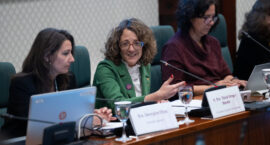Amidst the current attacks in the United States on women and abortion, legislators are sharing their abortion stories, demonstrating the importance of safe and accessible abortion.
Georgia state Rep. Shea Roberts (D), a mother, attorney and small business owner, had an abortion over 15 years ago, back when Roe v. Wade was still in effect. After losing her first race for the statehouse in 2018 by 1,200 votes, she went on to win her race in 2020 and has since used her platform to share her abortion story.












